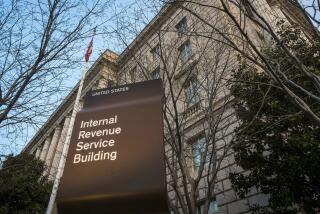Your Money : SPOTLIGHT ON TAXES : A Guide for Those Who Face an Audit
- Share via
What do you do if you’re among the unlucky few to be singled out for an IRS audit? A guide:
Know the type of audit. Audits come in myriad varieties. There are computer audits, where your return is kicked out of IRS processing because there’s a discrepancy between the numbers you’ve reported on your return and the number’s somebody--your banker, broker or employer, for example--have reported for you. Generally all you have to do is shoot back an explanation or a check.
There are audits of specific items, such as home office deductions, business expenses, casualty losses or employment taxes. And there are the onerous market specialization audits, which deal with every line on your tax return.
In some cases, auditors are simply looking for errors. In other cases, they’re examining a return because they suspect criminal fraud.
If you ask, the examiner will tell you what areas on your return are being examined. He or she will also tell you who will be participating in the audit, says Martin J. Horwitz, a Cincinnati tax attorney and author of “Survive Your IRS Crisis.”
Realize that an audit that includes a “special agent” is far more serious than one involving only a field examiner. Use that information to determine whether you can handle the audit alone or if you need a tax accountant or attorney to represent you.
Be prepared. Once you find out which areas of your return are under scrutiny, spend some time putting together complete and well-organized records. For instance, if the IRS is scrutinizing your charitable contributions, make sure you have all the appropriate receipts. If you gave substantial sums and failed to retain receipts, ask the charity if it can help reconstruct your records before you meet with the examiner. Providing the auditor with neat, well-organized records can not only speed up the audit, it can help assure the auditor that you’re not a crook.
Understand the purpose of record requests. Audits follow a regular formula. If the auditor thinks you’re overstating deductions, you’ll be asked for the records substantiating your costs. If you’re suspected of hiding income, you’ll be asked for bank statements. Knowing this can be important.
Consider, for example, a small businessman who hasn’t been meticulous about keeping his personal and corporate bank accounts separate. When he gets audited, the IRS will ask for deposit records for all his business accounts, and the agent will add the numbers together, figuring that the total should correspond to the gross income the businessman reported on his tax return.
This businessman should add the numbers in advance. If they don’t correspond, he should be looking for documents that explain the difference. It could be, for example, that he drained his personal savings account to keep the business going. If so, he should bring the statements for his savings account, even though the agent may not have asked for them.
Be honest. One of the biggest mistakes that normally honest people make in audits is lying, says Bernard Oster, partner at Cohen, Primiani & Foster in Century City. Specifically, auditors almost always ask if you have received gifts or inheritances. Flustered taxpayers often say no, even if they have, Oster says. The IRS will later use this lie to explain why it’s charging you with underreporting income.
Don’t volunteer. A good auditor will use the “pregnant pause” to his or her advantage. You’ll be asked a question. You’ll answer. And the auditor will sit there for several seconds and stare at you like you ought to have said something more.
If you wade into that pause with nervous babble, there’s a fair chance you’ll say something that could open up a new area of inquiry or otherwise hurt you in the long run. Remain calm. Answer the question--and only the question--honestly, directly, completely. Then stop.
Additionally, if the examiner asks a question you don’t know the answer to, don’t be afraid to admit you’re not sure, but offer to find out and report back, Horwitz says. Many people rush to answer even if they’re not sure. They end up correcting themselves later and sounding dishonest in the process. Facts count. Don’t answer unless you know.
Reschedule. Some taxpayers accept the IRS’ appointment no matter how soon or how inconvenient. That’s foolish. If you need a bit more time to prepare or if the meeting time doesn’t fit your business schedule, ask to make it on another date. While auditors are not so stupid that they’ll let the statute of limitations lapse while you stall, they’re generally willing to wait a reasonable amount of time to accommodate your schedule.
Don’t hesitate to hire. If you’ve been meticulous about keeping records, straightforward about your taxes and you’re facing a fairly simple audit, you don’t need to spend money hiring professional help. But if you’re facing a market specialization audit or one that involves a special investigator, hire a skilled tax accountant or tax attorney to represent you. What you spend on professional help is incidental compared to the amount of taxes and penalties you may be forced to pay if your audit goes poorly.
Appeal. Losing a point in an audit is not the final word. If you think the agent’s decision was wrong or unfair, you can appeal. If you lose at appeal, you can take the matter to tax court. Taxpayers don’t always win, but appeals settlements are common. About 87% of the cases taken to appeal are settled at that level. The rest go to court.
More to Read
Inside the business of entertainment
The Wide Shot brings you news, analysis and insights on everything from streaming wars to production — and what it all means for the future.
You may occasionally receive promotional content from the Los Angeles Times.










